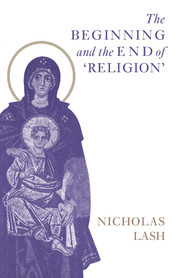Book contents
- Frontmatter
- Contents
- Preface
- PART ONE A MEETING-PLACE FOR TRUTH
- PART TWO EMERGING FROM MODERNITY
- 4 Observation, revelation and the posterity of Noah
- 5 On what kinds of things there are
- 6 Contemplation, metaphor and real knowledge
- 7 When did the theologians lose interest in theology?
- 8 Anselm seeking
- 9 Creation, courtesy and contemplation
- 10 Hollow centres and holy places
- 11 Hoping against hope, or Abraham's dilemma
- 12 Eagles and sheep: Christianity and the public order beyond modernity
- 13 Incarnation and determinate freedom
- 14 Beyond the end of history?
- List of works cited
- Index
7 - When did the theologians lose interest in theology?
Published online by Cambridge University Press: 05 March 2012
- Frontmatter
- Contents
- Preface
- PART ONE A MEETING-PLACE FOR TRUTH
- PART TWO EMERGING FROM MODERNITY
- 4 Observation, revelation and the posterity of Noah
- 5 On what kinds of things there are
- 6 Contemplation, metaphor and real knowledge
- 7 When did the theologians lose interest in theology?
- 8 Anselm seeking
- 9 Creation, courtesy and contemplation
- 10 Hollow centres and holy places
- 11 Hoping against hope, or Abraham's dilemma
- 12 Eagles and sheep: Christianity and the public order beyond modernity
- 13 Incarnation and determinate freedom
- 14 Beyond the end of history?
- List of works cited
- Index
Summary
INTRODUCTION
Consideration of how the word ‘God’ goes, of the grammar of its usage, is of central concern to any tradition of theological investigation. And it would surely not be quite arbitrary to propose that consideration of the uses of ‘God’ is not to be counted Christian unless it includes some mention of, or reference to, the figure of Jesus. In this sense, at least, a theological tradition whose doctrine of God lacked any christological component might be said to have ‘lost interest’ in the proper subject-matter of Christian theology. And yet Michael Buckley's magisterial study of the origins of modern atheism has shown that already in the early seventeenth century, thirty years before Newton's birth and within half a century of Calvin's death, patterns of theological enquiry were being laid down which ‘abstracted God from Christ as either definition or manifestation’. In their developed forms, these patterns of enquiry took Jesus as a teacher of morals, while looking to nature and the cosmos alone to teach us about God. Even to this day, ask almost any unsuspecting passer-by what they take the word ‘God’ to mean and the likelihood is that the answer (even from quite conservative Christians) will make no mention of Jesus.
- Type
- Chapter
- Information
- The Beginning and the End of 'Religion' , pp. 132 - 149Publisher: Cambridge University PressPrint publication year: 1996

